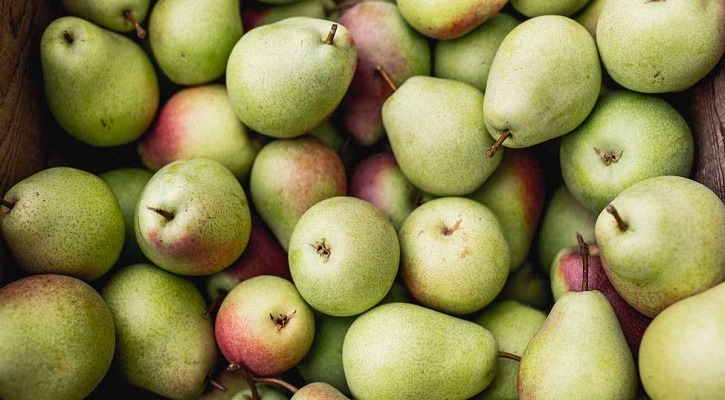
Health and Nutrition Benefits of Pears
- Womenscorner Desk
- September 19, 2020
Pears are sweet, bell-shaped fruits that have been enjoyed since ancient times. They can be eaten crisp or soft. They’re not only delicious but also offer many health benefits backed by science. Here are some impressive health benefits of pears :
Highly nutritious : Pears come in many different varieties. Bartlett, Bosc, and D’Anjou pears are among the most popular, but around 100 types are grown worldwide.
A medium-sized pear (178 grams) provides the following nutrients :
Calories: 101
Protein: 1 gram
Carbs: 27 grams
Fiber: 6 grams
Read More : Some Major Health Benefits of Ginger, Lemon, and Apple Tea
Vitamin C: 12% of the Daily Value (DV)
Vitamin K: 6% of DV
Potassium: 4% of the DV
Copper: 16% of DV
This same serving also provides small amounts of folate, provitamin A, and niacin. Folate and niacin are important for cellular function and energy production, while provitamin A supports skin health and wound healing. Pears are likewise a rich source of important minerals, such as copper and potassium. Copper plays a role in immunity, cholesterol metabolism, and nerve function, whereas potassium aids muscle contractions and heart function. What’s more, these fruits are an excellent source of polyphenol antioxidants, which protect against oxidative damage. Be sure to eat the whole pear, as the peel boasts up to six times more polyphenols than the flesh.
Read More : Papaya is Delicious and Loaded With Nutrients
May promote gut health : Pears are an excellent source of soluble and insoluble fiber, which are essential for digestive health. These fibers help maintain bowel regularity by softening and bulking up stool. One medium sized pear (178 grams) packs 6 grams of fiber 22% of your daily fiber needs. Additionally, soluble fibers feed the healthy bacteria in your gut. As such, they’re considered prebiotics, which are associated with healthy aging and improved immunity.
Contain beneficial plant compounds : Pears offer many beneficial plant compounds that give these fruits their different hues. For instance, anthocyanins lend a ruby-red hue to some pears. These compounds may improve heart health and strengthen blood vessels. Though specific research on pear anthocyanins is needed, numerous population studies suggest that a high intake of anthocyanin-rich foods like berries is associated
with a reduced risk of heart disease. Pears with green skin feature lutein and zeaxanthin, two compounds necessary to keep your vision sharp, especially as you age. Again, many of these beneficial plant compounds are concentrated in the skin.
Read More : Papaya Has Powerful Antioxidant Effects
Have anti-inflammatory properties :Although inflammation is a normal immune response, chronic or long-term inflammation can harm your health. It’s linked to certain illnesses, including heart disease and type 2 diabetes. Pears are a rich source of flavonoid antioxidants, which help fight inflammation and may decrease your risk of disease. Several large reviews tie high flavonoid intake to a reduced risk of heart disease and diabetes. This effect may be due to these compounds’ anti-inflammatory and antioxidant properties. What’s more, pears pack several vitamins and minerals, such as copper and vitamins C and K, which also combat inflammation.
May offer anticancer effects : Pears contain various compounds that may exhibit anticancer properties. For example, their anthocyanin and cinnamic acid contents have been shown to fight cancer. A few studies indicate that diets rich in fruits, including pears, may protect against some cancers, including those of the lung, stomach, and bladder.
Some population studies suggest that flavonoid-rich fruits like pears may also safeguard against breast and ovarian cancers, making this fruit a particularly smart choice for women. While eating more fruit may reduce your cancer risk, more research is needed. Pears should not be considered a replacement for cancer treatment.
Read More : Why We Should Eat Papaya?
Linked to a lower risk of diabetes : Pears particularly red varieties may help decrease diabetes risk. One large study in over 200,000 people found that eating 5 or more weekly servings of anthocyanin-rich fruits like red pears was associated with a 23% lower risk of type 2 diabetes. Additionally, a mouse study noted that plant compounds, including anthocyanins, in pear peel exhibited both anti-diabetes and anti-inflammatory effects. What’s more, the fiber in pears slows digestion, giving your body more time to break down and absorb carbs. This can also help regulate blood sugar levels, potentially helping prevent and control diabetes.
May boost heart health : Pears may lower your risk of heart disease. Their procyanidin antioxidants may decrease stiffness in heart tissue, lower LDL (bad) cholesterol, and increase HDL (good) cholesterol. The peel contains an important antioxidant called quercetin, which is thought to benefit heart health by decreasing inflammation and reducing heart disease risk factors like high blood pressure and cholesterol levels.
Read More : Health benefits Of Banana
One study in 40 adults with metabolic syndrome, a cluster of symptoms that increases your heart disease risk, found that eating 2 medium pears each day for 12 weeks lowered heart disease risk factors, such as high blood pressure and waist circumference.
A large, 17-year study in over 30,000 women revealed that every daily 80-gram portion of fruit decreased heart disease risk by 6–7%. For context, 1 medium pear weighs around 178 grams. Furthermore, regular intake of pears and other white-fleshed fruits is thought to lower stroke risk. One 10-year study in over 20,000 people determined that
every 25 grams of white-fleshed fruit eaten daily decreased stroke risk by 9%.
May help you lose weight : Pears are low in calories, high in water, and packed with fiber. This combination makes them a weight-loss-friendly food, as fiber and water can help keep you full. When full, you’re naturally less prone to keep eating. In one 12-week study, 40 adults who ate 2 pears daily lost up to 1.1 inches (2.7 cm) off their waist circumference. Plus, a 10-week study found that women who added 3 pears per day to their usual diet lost an average of 1.9 pounds (0.84 kg). They also saw improvements in their lipid profile, a marker of heart health.
Read More : Health Risks Of Banana
Easy to add to your diet : Pears are available year round and easy to find in most grocery stores. Eaten whole with a handful of nuts if you choose they make a great snack. It’s also easy to add them to your favorite dishes, such as oatmeal, salads, and smoothies. Popular cooking methods include roasting and poaching. Pears complement chicken or pork especially well. They likewise pair nicely with spices like cinnamon and nutmeg, cheeses like Gouda and brie, and ingredients like lemon and chocolate.
However you choose to eat them, remember to include the skin to get the most nutrients.





